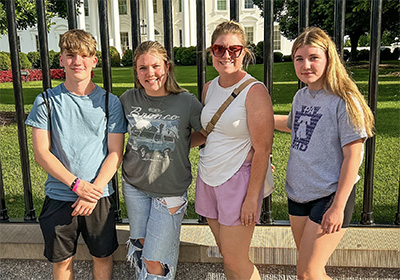Parenting with Metastatic Breast Cancer (mBC): Teens (Part Two)
By Kate


I would never want to be a teenager again if given the chance. The changing hormones, acne, weight changes, love interests, drama, challenging schedules, sports, trying to plan for the rest of your life? No, thank you!
In this day and age, being a teenager can be exhausting, as can being a parent of teenagers. You could've been the best parent who did all the "right" things, and your kid's teen years can still be tough. Now add "Mom has metastatic breast cancer" to that mix. Yikes.
My kids were very young when I was diagnosed with metastatic breast cancer (mBC). They grew up knowing I had cancer, but not fully comprehending what that meant. As they grew older, their capacity to understand what cancer was had changed. I tried to make sure that I allowed for open conversation with my children about my diagnosis, both as a family and individually. In having these conversations, I learned a lot about how they understood and dealt with it.
Every family is different and has individual needs when it comes to talking about an mBC diagnosis. For my family, I felt we had the most effective conversations by following the tips below.
Talk Calmy, Openly & Honestly
As much as possible, I tried to set the tone for the conversations by speaking calmly. For me and my family, I knew that crying or being very emotional would cause them more distress and I didn't want to add to that. Before we spoke, I took time to mentally prepare what I wanted to say by rehearsing and taking a few deep breaths. I spoke openly about the reality of my diagnosis followed by positive reinforcement. I tried saying things like:
“Metastatic breast cancer could take my life sooner than I want, but right now, I am still here.”
OR
“I feel sick today and won't be able to come to your game, but I hope to feel better tomorrow. If I do, maybe we can watch a movie.”
Some of the hardest conversations were the honest ones. Through the years, I created a community for myself full of other women who had metastatic breast cancer. My kids met many of these women, some of whom died.
There were times that I had to be very straightforward about what happened at the end of my friends’ lives. As best as I could, I wanted them to start thinking ahead and feeling prepared for what might happen to some of my other friends living with mBC, or even myself, and I couldn’t do that if I wasn’t being fully honest.
Encourage Questions
At school and at home, the internet offers teenagers access to all kinds of information about metastatic breast cancer. Some of those details can be scary, exaggerated, or downright false.
By fostering an environment where my teens can ask me questions, I’ve built trust between us. When someone is diagnosed with cancer, their whole family may be affected, so I know what happens to me also impacts them.
Since I am open with my teens and allow them the independence and confidence to come to me with questions, I have built a strong foundation of communication between us. This groundwork has been incredibly beneficial for our relationship beyond just my health.
Find Resources
Finding ways for your teens to feel supported and connected to the community can sometimes help them feel less alone. I found resources like therapy, support groups, other teens whose parents have cancer, or even nonprofits dedicated to guiding kids through a parent’s diagnosis. This has helped my teens navigate the complexities of growing up with a mom living with mBC.
I want my children to know that their mental health and well-being are a priority for me. It can be easy for teens to feel isolated, alone, and anxious. However, encouraging them to connect with professionals or to meet others in similar situations might mitigate some of those feelings.
Don't Make Promises
Living with a terminal illness means that it can be hard to predict week-to-week how you’ll be feeling, physically or emotionally. Sometimes, treatment wipes me out for a few days. One big lesson I had to learn as a parent was that I cannot make promises that I may not be able to keep.
“I promise I will come to the next game.”
“I promise I will make homemade lasagna for dinner next week.”
“I promise we will go to the fair tomorrow.”
Those are some high-stake promises. And the truth is, all it would take is one bad scan, one cold, one pain in my back and I am breaking those promises. Even though I mean well, breaking promises can sometimes lead to distrust and disappointment.
I tried some of these phrases instead:
I promise I will come to the next game. “Even if I can't make it, I am still your biggest fan!”
I promise I will make homemade lasagna for dinner next week. “The next time I make lasagna would you like to help me?”
I promise we will go to the fair tomorrow. “Just in case we cannot go tomorrow, let's look at other dates that could work.”
Allow Them to Feel
Teenagers’ brains are still developing, which can make it hard for them to regulate emotions. I remind myself often that they need to be taught the best ways to constructively develop their emotional intelligence so that they can build healthy coping mechanisms. I make a point to try not to minimize my teens’ feelings or make them feel that they cannot express themselves to me.
At the end of the day, I am responsible for making sure they learn healthy coping mechanisms. There are a few ways I go about this:
- Ask Open-Ended Questions: This helps my teens recognize and understand what emotions they are feeling and what triggered those emotions.
- Validate and Empathize Their Feelings: I reiterate that it is perfectly okay to feel this way. I remind myself that how they perceive their feelings is their reality, and I sympathize with how that makes them feel- even if I would not have felt the same in that situation.
- Ask If They Want Advice: I ask them if they would like advice or just for me to listen. Sometimes, my teens just want to feel heard and loved, rather than Mommy trying to solve their problems.
At home, my openness and safe culture has helped my teens recognize and process stress, which in turn helps them strengthen problem-solving skills and increase self-confidence. Talking about emotions should never be seen as a weakness. It is a strength I hope they carry into adulthood!
Even if metastatic breast cancer takes me away before I am ready, I can confidently say by promoting these healthy habits, my teens are equipped to navigate this crazy thing called life.










